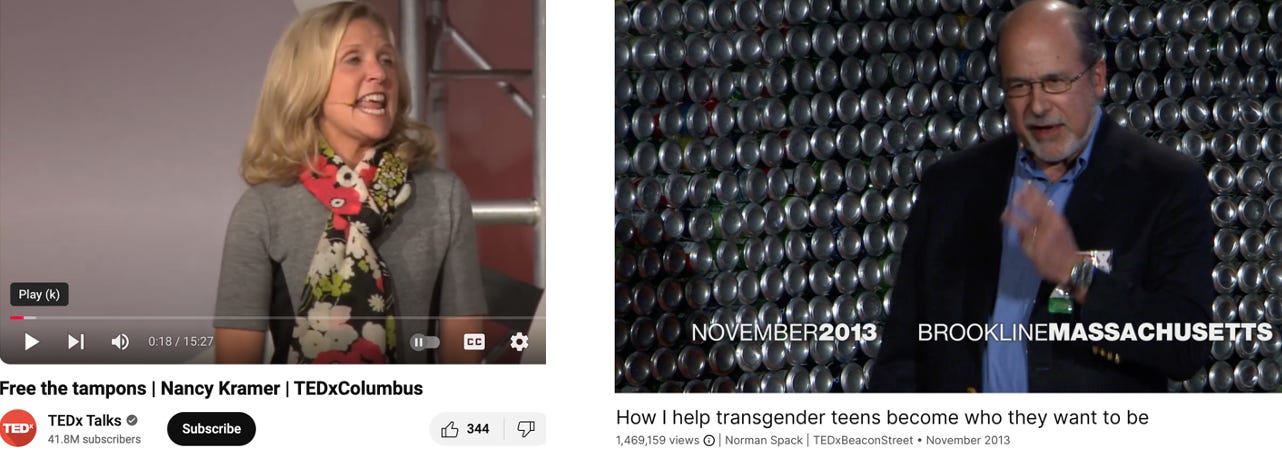
“Tampon Tim” come the chants. Under Governor Tim Walz’s governorship, Minnesota is collecting brownie points for all things “trans.” In January 2024 MN HF 44 went into effect requiring public schools to provide access to free menstrual products. “The products must be available to all menstruating students in restrooms regularly used by students in grades 4 to 12…,” reads the bill. Note the term “menstruating students.” It means “trans” and “nonbinary students” are included. This is important to the “gender” empire.
Blue states might be embracing the “trans" agenda faster and to greater degrees than red states, but “trans” has a way of sneaking into agendas where no one might think to look. Menstruation, a bodily function confined to females, is one such place. It is a function important to the future of mankind and one the synthetic biology industry and their transhumanist masters desire to command.
Consider the Harvard Wyss School of Biologically Inspired Engineering where Lactation Biologics have engineered a protein to induce milk production for “lactating persons.” The drug they claim, “could help advance health equity and create resilient infant feeding systems in an age of increasing natural disasters and climate crises.” Or consider the Cervix Chip funded by the Bill and Melinda Gates Foundation. What about God’s design? What about man’s nature?
It would be wise to consider what is behind terms like “menstruating students” and not just chant “Tampon Tim” after comrades in arms. Red states are snared in the trans agenda and governors blue and red are only taking marching orders from elsewhere. It could be “Tampon DeWine.” That would fit. Or how about “Tampon Thiel.” That would fit too. But “Tampon Tech” might just fit the best.
“Menstruator” is the preferred language of advocates for the “free the tampon,” “period poverty” cause. “Menstruating people,” “menstruating students,” or “menstruating prisoners” are prevailing terms used in legal initiatives. Bills are composed often avoiding or limiting the present-day dirty words, “female” and “women.” What is a “menstruator” or “menstruating person”? They are “bleeders,” “uterus havers,” “incubators,” and other slanderous terms. The names used in place of “women,” once the accepted term for adult human females, litter medicine, law, and education today. Could it be that “free the tampon” and “period poverty” refer to politicized movements that only serve the rise of technocratic global state?
Menstruation is now “inclusive.” “Non-binary” and “transgender” narratives are given priority over sexed reality. This is a system that views female bodies as functions to be manipulated, medicalized, funded, bullied, serviced, and used rather than human beings worthy of life and love, and most importantly bringing forth and nurturing life itself.
But it is not just women. The emerging system cares for neither sex permitting confused males to synthetically breastfeed and possibly more. With ectogenesis on the horizon, could the “gender” narratives be grooming today’s youth to be experimental specimens for this dystopian future? The novel menstruation initiatives undermine the health and well-being of women and girls as well as men and boys. They serve to increase business gains in transgender and reproductive healthcare industries while providing experimentation towards future ventures.
Nancy Kramer and the “Free the Tampon” Movement
The “Free the Tampon” movement launched in 2013 when Nancy Kramer took the stage at TEDx Columbus. With the tagline “ideas change everything,” TED is a place where corporate influence is abundant, especially the tech industry. Kramer is a pioneer in digital marketing whose first client was Apple Inc. She would go on to hold the revered title of Chief Evangelist at IBM and claims to have been influenced to take the position in part due to IBM’s “non-discrimination policy for sexual orientation in 1984 and reimbursement of transgender reconstructive surgery since early 2000s.”

After touting her tech experience, she informs the audience that what they are about to hear has nothing to do with technology. Believe that?
TED was first launched in 1984 by a man nicknamed the “The Wurmanizer” in a Wired magazine article. “Wurman has tracked the convergence of media, technology, and business so closely that he can pose half-convincingly as ringmaster of the digital economy,” claims Wired. According to the TED website, TED was first conceived by the, “observation of a powerful convergence among three fields: technology, entertainment and design.” The Apple Macintosh has been a repeat feature in TED talks but soon talks were peppered with the idea of merging man and machine. Consider transhumanist Ray Kurzweil’s talk “The Accelerating Power of Technology” presented on the TED stage in 2005.
Kramer has served on the Global TEDx Council and has been co-organizer of TEDx Columbus since it began. Also in 2013, just one month after Kramer’s TEDx Columbus talk, Dr. Norman Spack gave a TED talk titled “How I help transgender teens be who they want to be.” Converging human bodies with technology is “the thing” today. Synthetic sex is an avenue helping steer humanity in that direction.
In the years since Kramer and Spack hit the stage, things got weirder. More talks have been peppered with the idea of melding man and machine and “transgender” speakers or advocates present talks that make people question reality. In 2014 Kurzweil reappeared on the stage with a talk titled “Get Ready for Hybrid Thinking.” Martine Rothblatt’s “My daughter, my wife, our robot, and the quest for immorality” aired in 2015. Martine, a man who now considers himself a woman, tells his story. It is a must watch. His book The Apartheid of Sex, his company (United Therapeutics) and its transplantation goals, and his collaborator (Kurzweil) are discussed, along with the development of what he calls “consciousness operating systems” or “mind clones.”

Nancy Kramer also happens to sit on the board of The Ohio State University ( OSU) Advancement. “The Advancement Inclusion Council advocates for an inclusive culture that inspires an exceptionally diverse and talented team” the website declares. Like many universities today, OSU has “Trans@” resources and a transgender and gender diversity statement. Like most academic research centers today, OSU has “gender-affirming” medical programs and much more.
TEDx Columbus and TEDx OSU have also had their share of “trans” speakers. Take “Hey doc, some boys are born girls” by FTM Decker Moss in 2014, “A Lifesaving Shift in the Transgender Conversation” by Columbus native FTM Ashton Colby in 2019 or “Trans Rights -What’s in it for You?” by MTF Ramona Peel in 2021. Are all ideas worth consideration?
States and Product Vendors Fall to the Gender Ruse
MN is one of 28 states requiring schools to provide free menstruation products. Red states and 2024 election swing states are included. Among them are TX, UT, NE, MO, AR, OH, AL, IA, NC, GA, and NV. Ohio’s governor DeWine has allotted 5M for dispensers and period products for the fiscal year 2024-25 in schools with students in grades 6-12 placing the OH Department of Education in charge of the program. Why is no one shouting, “Tampon DeWine”?
Vendors of bathrooms accessories are providing vend-free and token operated machines to meet “free the tampon” legislative demands. Bobrick, an industry leader in washroom accessories since 1906 has limited marketing verbiage to phrases like, “Providing access to menstrual care products, dispensers, and disposal solutions in public restrooms…” For the heavy lifting in marketing to the new agenda, they have partnered with the International Sanitary Supply Association (ISSA), a trade association that created a 3-pager titled “Best Practices for Menstrual Care in Public Restrooms.” While the opening line might include “women,” it quickly changes to “menstruator,” a term even Webster’s does not recognize. Not yet anyway.
ISSA began as a US trade association but has grown into a global one. They use global talking points that have usurped natural language. They take their cues from NGOs like Alliance for Period Supplies and studies from Thinx and Period Inc.
Nadya Okamoto and Period Inc.
As a high school student in 2014 Nadya Okamoto co-founded the nonprofit Period Inc. Period Inc. educates, provides and advocates for “menstruators.”
As a senior Okamoto would receive a Gates Millenium Scholarship and then in 2016 a Coca-Cola scholarship. Period Inc. would grow to hundreds of chapters across the country. In 2017 her book Period Power: A Manifesto for the Menstrual Movement was published with progressive messaging using gender-neutral language. A 2018 School Library Journal review said the manifesto had, “…the potential to become the next go-to book for teens looking for more information about their bodies.”
In 2020 Okamoto co-founded a period brand company called August that panders to the global “gender” movement to abolish sexed reality. Okamoto calls herself “queer.” Employees submit to pronoun requirements and training. Seed money would come from venture capital firm Hannah Grey, a company that funds emerging technologies. Among Hannah Grey’s other investments is Sunfish, a company providing “a new way to navigate, protect, and pay for IVF, surrogacy, egg donors, and egg freezing.” Sunfish has a resource page for LGBTIQA+ parenthood.
Aside from the edgy marketing including photos that perhaps verge on pornographic, August fights what they call “anti-trans legislation,” has a podcast with an episode titled “Gender-Inclusive Period Talk,” and other modern day novelties.
Period partners with Aydian Dowling’s Point of Pride to help fund chest binders, hormone replacement therapy, transgender surgeries and more. Posts titled Cutting through the Chase and FTM YouTuber Peddles Porn fill readers in on how instrumental Dowling and her testosterone injected female friends are to the “gender” empire.

August also works with FTM advocate and ex-Harvard men’s team swimmer Schuyler Bailar. “Although menstruation is often labeled as only a women’s issue, this is not the case. Menstrual advocacy should be gender inclusive and gender-affirming to best advance care for anyone who menstruates,” says Bailar.
Catching the Bug on US Campuses
By 2015, the “free the tampon” digital marketing was paying off. Campuses were soon abuzz with young women falling prey to the narrative. A UCLA essay went viral. It began with an editor’s note before launching into the need for government subsidies.
This blog post refers to individuals who menstruate as women because the author wanted to highlight gender inequality in health care. We acknowledge that not all individuals who menstruate identify as women and that not all individuals who identify as women menstruate, but feel this generalization is appropriate considering the gendered nature of most health care policies.
That was 2015. Today such a note is not always necessary. Once novel “gender” language is now understood.
The Product Suppliers
Alliance for Period Supplies was founded by U of Kotex, manufacturer of brands once known as “feminine care products.” This so-called grassroots endeavor is anything but. It falls under the National Diaper Bank Network (NDBN) which launched in 2011.
In 2023 NDBN touted donations that included 8M U of Kotex period underwear and 100K Thinx period underwear. These brands cater to the trans and non-binary population, a population nearing zero not long ago. The NDBN YouTube “network minute” video titled “Period Pride” declares:
While it’s true, most people who menstruate are female, not all women and girls menstruate, and some trans males have menstrual periods. The Alliance for Period Supplies is dedicated to making sure that everyone has a safe and dignified period, and everyone means every one [sic].
FTM transgender model Sawyer DeVuyst also provides a Thinx YouTube short film. While donning a pair of Thinx absorbent boyshorts and with a testosterone induced appearance and voice, she begins, “I never felt like I was in the wrong body.” “And still do not feel like I am in the wrong body,” she continues. Instead she tells the audience she thinks she is in the “wrong society.” This is NOT about treating people who have “gender dysphoria” as often claimed, but about engineering society for a future where sexed reality is obliterated.

Men (actual men) have been included in marketing. Consider the video “Making of MENstruation” that recounts the creation of a commercial subjecting men to embarrassing roles as “menstruators.” The commercial was banned many places for graphic content. Why is the video still on YouTube? Campaigns that push the envelope are the name of the game for a reason. Kimberly Clark would soon invest 25M in Thinx. Kimberly Clark joined the UN Global Compact for Global causes in 2010. Pushing the envelope of marketing might be a company goal, but pushing the envelope of the human body is the name of the global game. It serves to sell a global pack of “gender” lies.
It turns out the NDBN has been supported since its inception by Seedlings Foundation, a foundation founded by OH native Karen Pritzker, sister to MTF Jennifer Pritzker. Pritzker is one of the Rich White Men Institutionalizing Transgender Ideology. Among Seedlings grantees is New Haven Children’s Hospital, a member of New Haven Anchor Health. This initiative aligns business goals with social determinants of health (SDOH) where sexual orientation and gender identity (SOGI) are inevitably found today. This business model is the growing norm in healthcare across the country.
NDBN highlights The Period Pantry Project, a project launched at Ohio University (OU) in 2022. The project used NDBN funding to launch Period Pride. They added LGBT distribution centers to their network and created “inclusive” educational materials about mental health. The organization advocated and helped pass OH state bills for free menstruation products. An OU student senate bill requires free tampons in campus men’s rooms. The project has partnered with the Ohio based company, Aunt Flow.
Claire Coder and Aunt Flow
Ohio native Claire Coder dropped out of college at the age of 19 in 2017 to start Aunt Flow, a company “by menstruators, for menstruators.” The company provides vend-free machines to establishments and advocates for government funding of the products they carry. Funding via Techstars and a Thiel Fellowship have enabled the success of her start-up.
Thiel funds college drop outs in business ventures usually in STEM fields to work on their big ideas. Aunt Flow might seem like an anomaly among them, but when the nature of marketing a product undermines sexed reality it begins to make sense. Coder might have begun her company with good intentions, but this is not about doing something for the good of woman and girls but about undermining sexed reality altogether. Would success have been possible without the “gender”messaging?
As a member of the Paypal Mafia, Thiel and partners have “hands in many, if not most, of today’s most valuable private tech companies.” Educational Datamining for Synthetic Sex and Technocratic Gender Harmony show how data collection is paramount to “gender” industry success. Governor’s like DeWine demand data collection in relation to “gender” medicine but “gender” medicine is a farce altogether. Does the data serve the technocratic global state and the growth of an industry that harms? After all data is being pushed into novel boxes to meet the demands for technocratic “gender” harmony where being '“trans” is just another way to be human. Thiel claims focusing on culture wars is not a good thing but his actions say otherwise.
Critical Menstruation Studies: A Campaign for Social Change
In 2020 The Palgrave Handbook of Critical Menstruation Studies became available. This is a novel “resource for researchers, policy makers, practitioners, and activists new to [sic], and already familiar with the field as it rapidly develops and expands.” In other words, the handbook is created to promote social change.
A chapter titled, “Degendering Menstruation: Making Trans Menstruators Matter,” presents absurdities like claiming that not all who menstruate are women and that “degendering” menstruation is necessary to address menstrual shame. Next it launches into problems of menstruation. Product design, bathroom access, and healthcare for transgender people get mentions. Sound familiar? These are issues pushed in industry and the political landscape today.
The chapter resources provide clues to the sources of these lies. While feminists like Judith Butler make appearances so do MTF transactivists like Susan Stryker, editor of Duke Transgender Quarterly. Does Duke being considered a “Southern hub for youth gender transition” have any influence? How about a reference by Mark A. Schuster, a gay Yale and Harvard educated physician who has held numerous positions at UCLA Medical School and Boston Children’s Hospital?
Schuster’s 2010 speech, “On Being Gay in Medicine” at Boston Children’s Gay, Lesbian, Bisexual, Transgender & Friends Celebration has been used throughout industry as a teaching tool. Schuster would go on to be elected to the National Academy of Medicine (NAM) and sit on the Committee of LGBT Health. This committee is responsible for the book, The Health of Lesbian, Gay, and Bisexual, and Transgender People: Building a Foundation for Better Understanding (2011) that serves as a foundation for today’s “gender” empire.
In 2017 Schuster joined Kaiser Permanente’s new medical school. According to the website, Kaiser Permanente’s opening class was composed of 29% LGBTQ+ members. 6% are “genderqueer nonbinary.” This is staggering. MTF Rachel Levine has since joined Schuster on the NAM. Does “critical menstruation studies” begin to make more sense? It is all about markets.
Males, Females, Tech
While Webster’s has no clue what is a “menstruator,” Chat GPT does:
A menstruator is a term used to refer to someone who experiences menstruation, typically in the context of discussions about gender inclusivity. It recognizes that not all individuals who menstruate identify as female; some may identify as male or non-binary. The term aims to be inclusive and acknowledge the diverse identities of people who have menstrual cycles.
Erasing the sexes in a virtual world is easy. In the real world, not so much. Synthetic sex is a lie. What is possible, is to create a world that permits experimentation towards synthetic biology and transhumanist goals with many victims falling prey to the harms of a dark agenda.
Remember no one legislates free toilet paper. The outcome of the “free the tampon” movement is the government has its hands all over female bodily functions and sexed reality to boot.
Today “feminists” get blamed for all things “trans” and they in turn point at the “patriarchy.” Maybe not all, but most men and women have known since the dawn of time how to answer the question, “What is a woman?” It is the narrative that has changed through the years. It is one that is confusing many people thanks to clever marketing, digital expedience, and bold lies. Behind that narrative can be found industry with the tech sector taking on an increasingly prominent role since the turn of the century. Do not young men and women deserve to grow up in a world of mutual respect with clear language about their bodies?












“By menstruators, for menstruators”. Jesus H Christ. What an absurd world we’re living in right now.
Thanks for the great article. You’re absolutely right that this is all about markets. (Grassroots my arse.)
I wouldn't call Judith Butler a "feminist." I think "grifter" is a better definition.